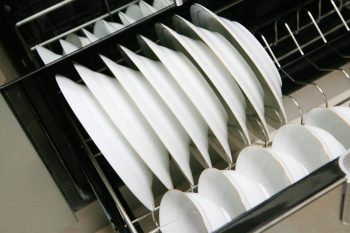
If you’ve been noticing an unpleasant smell in your laundry room lately, the culprit could be your washing machine drain. Over time, the drain can accumulate dirt, grease, soap scum, and bacteria, all of which can cause foul odors. Fortunately, you can clean it yourself using simple household items, or seek professional help if the smell persists. In this article, we will guide you on how to clean a smelly washing machine drain and prevent future odors.
To clean a smelly washing machine drain, first identify if the smell is indeed from the drain. Then, prepare a cleaning solution of baking soda and water or vinegar and baking soda. Pour this into the detergent dispenser and run a normal wash cycle without clothes. After the cycle, pour hot or boiling water down the drain trap. If the drain is still clogged, use a drain snake, drain cleaning chemicals, or a homemade solution to unclog it. Regularly clean your washing machine to prevent future odors. If the smell persists, seek professional help.
Identifying the Problem
Before you start cleaning, it’s crucial to identify if the smell is indeed coming from the washing machine drain. Run a hot water cycle with vinegar or bleach to eliminate any lingering odors and bacteria inside the machine. If the smell persists after the cycle, it’s likely coming from the drain.
Common causes of a smelly washing machine drain include bacteria, detergent build-up, mould and mildew, dirt and grease build-up, and poor ventilation. An incorrectly installed drain hose can also contribute to unpleasant odors.
Cleaning the Drain: A Step-by-Step Procedure
Now that you’ve identified the cause, you can proceed to clean the drain. Here are the steps to follow:
- Prepare the Cleaning Solution: Mix 1/4 cup of baking soda with 1/4 cup of water. Alternatively, you can use a combination of vinegar and baking soda for a more natural option.
- Pour the Solution into the Detergent Dispenser: Add the baking soda and water mixture or vinegar to the detergent dispenser of your washing machine.
- Run a Normal Wash Cycle without Clothes: Start a regular wash cycle without any clothes in the machine to allow the cleaning solution to work through the drain.
- Pour Hot or Boiling Water Down the Drain Trap: After the cycle is complete, pour hot or boiling water down the drain trap to help dissolve any remaining residue and flush out the drain.
- Use a Drain Snake or a Homemade Solution for Stubborn Clogs: If the drain is still clogged, you can use a drain snake, drain cleaning chemicals, or a homemade solution of water, baking soda, and vinegar to unclog the washing machine drain.
- Clean the Washing Machine Regularly: To prevent future odors, clean your washing machine regularly, including the drain, dryer vent, and drum.
Remember to be cautious when using drain cleaners, as repeated use can damage your washing machine.
Safety Measures to Consider
Cleaning the drain involves various safety hazards, so it’s crucial to take precautions. Wear protective clothing, use proper equipment, ensure good ventilation, avoid mixing chemicals, and beware of splashback. Use natural products when possible, inspect and maintain equipment, clean and sanitize the area after finishing the job, and seek professional help if needed.
When to Seek Professional Help
If the smell persists after trying these methods, consider consulting a professional plumber for further assistance. A persistent smell could indicate a more severe issue, such as a blockage deep in the sewer line or a problem with the washing machine itself.
Preventing Future Odors
To prevent future smells, keep the washer door open after use to allow air circulation and dry out any moisture. Regularly clean your washing machine according to the manufacturer’s instructions, and use the appropriate amount of detergent.
Conclusion
Cleaning a smelly washing machine drain can be a simple DIY task. All it requires is a little time and some household items. However, if the smell persists despite your best efforts, don’t hesitate to call a professional. It’s better to address the issue promptly to prevent further damage and maintain a healthy and fresh-smelling laundry room.
Remember, prevention is always better than cure. Regularly cleaning your washing machine and its components can help prevent odors and keep your machine running smoothly. Happy washing!
Frequently Asked Questions
How often should I clean my washing machine drain?
Ideally, you should aim to clean your washing machine drain every 3 to 4 months. However, if you notice a persistent odor or poor drainage, you may need to clean it more frequently.
Can I use any type of vinegar for the cleaning solution?
Yes, you can use any type of vinegar. However, distilled white vinegar is often recommended because it’s inexpensive and highly effective at removing dirt, grease, and odors.
Is it safe to use bleach to clean the washing machine drain?
Yes, it is safe to use bleach, but it should be done carefully. Never mix bleach with vinegar or any other cleaning solution as it can produce toxic fumes. Also, use bleach sparingly to avoid damaging rubber seals and other components of your washing machine.
What if I don’t have a drain snake?
If you don’t have a drain snake, you can use a straightened wire hanger to try and dislodge any clogs in the drain. However, be careful not to damage the drain pipe.
Can I prevent the drain from smelling in the first place?
Yes, regular cleaning and proper usage of your washing machine can help prevent odors. This includes using the right amount of detergent, leaving the door open after use to allow it to dry, and cleaning the machine regularly as per the manufacturer’s instructions.












